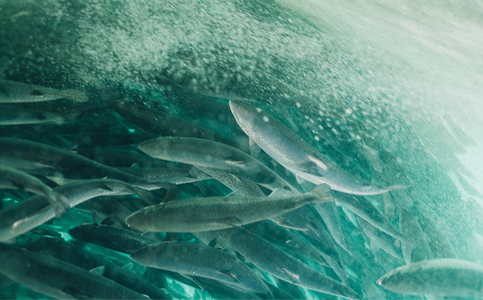Salmon producer Atlantic Sapphire swims toward global primacy

A Norwegian fish-farming complex that plans to produce at full build-out about 1 billion servings of salmon a year near Homestead at what would then be the world’s largest aquaculture facility is getting a $250 million loan boost with industrial revenue bonds approved by Miami-Dade commissioners.
Atlantic Sapphire USA is in expansion mode at its 22275 SW 272nd St. operation, where it now employs 170 people and projects hiring about 100 more with an annual $12 million payroll as it completes its scheduled expansion.
It plans to use proceeds of the tax-exempt facility bonds to improve wastewater treatment and disposal for the land-based, full growth cycle salmon farming on about 20 acres.
The bonds would be issued by the Miami-Dade County Industrial Development Authority. Neither the authority nor the county has any liability for repayment of the bonds.
The European company originally raised its fish in Denmark but has moved all operations to the Homestead area. Its largest single customer is Publix, which sells Atlantic Sapphire salmon in all its 818 Florida supermarkets.
The funding will expand to a second phase with an added 15,000 tons of annual production, the company says. Construction has started on the first of the growing systems and they are expected to be completed by early 2025, according to documents provided to county commissioners this week. Full Phase II production is expected in 2026 with an annual production of 25,000 tons.
Future investment, the company says, will lead to 220,000 tons a year – about 1 billion servings of salmon annually.
The Industrial Development Authority held an advertised Feb. 22 hearing on the bond issuance, with no speakers from the public.
As Atlantic Sapphire expands, a Norwegian feed factory, Skretting, is moving toward construction nearby. Atlantic Sapphire is Skretting’s biggest customer for salmon feed. The plan to build a Skretting factory, with Skretting financing it, near Atlantic Sapphire is in exchange for Atlantic Sapphire purchasing the majority of its salmon feed from Skretting for 10 years.
“The Skretting facility is in its process of permitting, pre-engineering and it is progressing according to the plan,” Max Francia, director of marketing for Atlantic Sapphire, told Miami Today last year.
Feed is Atlantic Sapphire’s largest cost component. Skretting currently supplies the company’s feed from its Canadian operations, and executives say having a local source of feed will be a huge saving, especially in view of cost hikes in logistics and transport.
“Having our most important production input locally fits perfectly with our strategy,” Johan E. Andreassen, CEO of Atlantic Sapphire USA, said in a prepared statement last year.
“It reduces production cost and greenhouse gas emissions significantly, while at the same time accelerating the technological development of a customized feed for our bluehouses that we expect will lead to higher productivity and output. Further, we see this agreement with the world’s leading salmon feed producer as a strong sign of confidence in our business case and future growth.”
Bluehouse fish farming differs from traditional land-based methods in that the fish are raised in one location, swimming through a series of tanks known as bluehouses that simulate the salmon’s growth cycle in nature.
Atlantic Sapphire’s first bluehouses were built and refined in a small village in Denmark, and European investors constitute a majority of its shareholders. Now that the company’s operations have moved to the US, however, more Americans are investing in it “and we expect that trend to go forward,” said Chief Finance Officer and Managing Director Karl Øystein Øyehaug.
“South Florida has a geological advantage in the Florida Aquifer,” he said. “Its attributes fit us very well – much better than coastal Denmark –which is why we moved all of our operations to South Florida.”
The company has secured US water permits to produce nine times its current production amount here yearly, its website says.
The Phase I 390,000-square-foot facility near Homestead General Aviation Airport comprises roughly 9 acres under a climate-controlled roof and housed about 3 million fish in operations testing, Mr. Prado told Miami Today in 2019.
“As in agriculture, you have greenhouses,” he said. “We call our facility a bluehouse.”
The company imports eggs from Iceland and Norway. The fish go through a 20-month growth cycle, moving to larger and larger tanks to simulate their natural spawning process. Ten months after hatching in freshwater, they move to saltwater tanks, where they spend another 10 months before reaching full maturity – and harvest weight – at 10 pounds.
According to Mr. Prado, the salmon perpetually swim in one- to two-knot currents: “[They’re] constantly exercising.”
The fish-producing industry, through conventional farming methods, has grown so massive that companies are now unable to expand without a multitude of challenges, he said.
“They’re dealing with untreated fish waste in the bays. The fish are exposed to disease. They escape. [There are] lots of micro-plastics,” he said. “With Atlantic Sapphire’s method, all of this goes away.”
The land-based approach also reduces the county’s carbon footprint, he said, because it eliminates the need to fly in as much fresh fish daily.
Atlantic Sapphire’s approach to indoor salmon farming isn’t unique to South Florida, Mr. Prado continued, noting projects across nearly every continent.







Recent Comments